EXTENDED! CO residents can apply FOR FREE through December 1st. Apply now!
Secure your scholarship offer in just 2-3 days through December 17! Get started.
No waiting. No guessing. Join us for Instant Decision Day on December 3. Register now.
EXTENDED! CO residents can apply FOR FREE through December 1st. Apply now!
Secure your scholarship offer in just 2-3 days through December 17! Get started.
No waiting. No guessing. Join us for Instant Decision Day on December 3. Register now.
This article is an excerpt from a longer story published in the University of Denver Magazine. Read the full version at https://stories.du.edu/magazine/
With guidance from Korbel professor Keith Gehring, grad student Raluca Alexandrescu turned a bold idea into a Fulbright-winning project and a life-changing experience.
When Raluca Alexandrescu first began her Fulbright application, she wasn’t sure she would qualify, let alone stand out in a field of top-tier candidates. A graduate student in information technology with a focus on AI strategy, she had a vision: to return to Romania, her home country, and study how small businesses in Bucharest could better adopt digital tools. But translating that vision into a competitive proposal would take more than hard work. It would take clarity and perseverance—and the right mentor.
Enter Keith Gehring, a teaching associate professor at DU’s Josef Korbel School of Global and Public Affairs. Gehring—who was recently awarded a Fulbright grant himself and will go to Serbia in March to teach data forecasting—had served on Fulbright review panels before. When he read Alexandrescu’s proposal, something struck him.
“It was immediately clear to me that Raluca had something to say, and there was a sincerity behind her project,” he says. “So, I wanted to help her articulate her vision in a way that would resonate for the reviewers.”
Gehring views serving as a reviewer as paramount to his role as an educator. “If we can’t be a bridge to what our students want to do next, that’s a missed opportunity,” he says.
Alexandrescu had already submitted her application when Gehring first met her as a panelist on her campus interview. Afterward, he offered to help her refine it, and the two began meeting one on one, with Gehring pushing her to sharpen her focus and define her audience.
“What really stood out for me was that Keith’s feedback was both critical and encouraging. Maybe for some people that’s not important, but for me, it meant everything.”
Raluca Alexandrescu, graduate student
“What really stood out for me,” Alexandrescu says, “was that Keith’s feedback was both critical and encouraging. Maybe for some people that’s not important, but for me, it meant everything. He was the first person since I’ve been back as a graduate student who genuinely cared and wanted me to succeed.”
Alexandrescu’s project proposal—to explore the digitalization gap facing small businesses in Romania—was deeply personal. Having spent much of her life in the U.S., she saw the Fulbright program as a way to reconnect and give back.
“I’ve been going back and forth to Romania more lately, but I haven’t been able to really stay,” she explains. “I feel like I’m part of both worlds, and this is a way to be a bridge—to open opportunities, build relationships, and maybe help Romanian businesses take advantage of AI and innovation.”
That sense of purpose didn’t go unnoticed. For Gehring, Alexandrescu’s sincerity was exactly what Fulbright aims to support.
“There’s an intangible we look for—sincerity of purpose,” he says. “In Raluca’s case, it wasn’t just about researching digitization. It was about being a bridge between her home country and the U.S., using her skills to expand opportunity. That kind of vision matters.”
Eventually, the news came that Alexandrescu had been awarded a Fulbright. She was abroad when she found out and remembers bursting into tears.
“I just started crying, and I felt so much joy in my heart,” she says. “It confirmed how much I really wanted this.”
Gehring, too, remembers the moment he got her message—while attending his own child’s high school graduation in DU’s Magness Arena.
“I was sitting there as all the students were walking across the stage, and I thought, ‘Wow, in front of me are all these kids with future potential, and here is Raluca, someone who is realizing her potential and whose future is unfolding right in this moment.’”
For both mentor and mentee, the experience reinforced the value of connection and persistence.
“Mentorship doesn’t have to be formal,” Gehring says. “Sometimes it starts with a hallway conversation or an office hours visit. And if I’m not the right fit, it’s my job to point a student to someone who is.”
Alexandrescu agrees. “Keep at it,” she advises other students looking for a mentor. “Keep knocking on doors and asking questions. It can take time to find the right person, but don’t get discouraged. Surround yourself with people who see your potential.”
Over three immersive days in the Yampa Valley in northwestern Colorado, community leaders from across the state gathered for the final stop on the Colorado Project’s Rural Learning Tour. Convened by the University of Denver’s Josef Korbel School of Global and Public Affairs and the Scrivner Institute of Public Policy, the Colorado Project is a statewide effort to advance shared prosperity, sustainability, and inclusive growth in every region of the state. The Yampa Valley convening offered a clear view of both the opportunities and challenges facing rural communities. Guided by the project’s cornerstones—sustainability and resilience, economic mobility and workforce, cost of living, and entrepreneurship and innovation—participants engaged directly with local partners who are shaping the Valley’s future.
The convening kicked off in Craig with a site visit to Fitch Ranch Artisan Meat Co, where we learned about small-scale meat processing supporting local ranchers. That visit was followed by a roundtable with local leaders including the City of Craig, the Small Business Development Center, and Memorial Regional Health, framing the region’s need for economic diversification, small business vitality, and healthcare access.
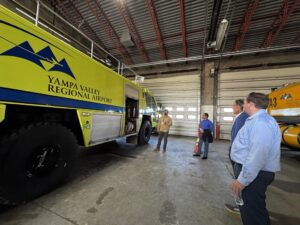
Day two in Hayden focused on infrastructure solutions, economic development, and workforce needs. A visit to the Yampa Valley Regional Airport showcased the need for creative transportation options to the region, which is approximately a 3.5-hour drive from Denver’s airport. An opening conversation with the Yampa Valley Community Foundation at the historic Hayden Granary grounded participants in regional history and values, and an economic development and workforce panel explored career pipelines, employer needs, and regional collaboration opportunities. A Hayden Heritage Walking Tour showcased main street revitalization efforts and community-led placemaking.
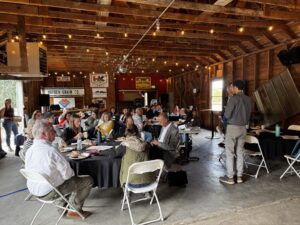
The final day underscored the valley’s creative and systems-level approaches. Site visits to Steamboat Creates and the Yampa Valley Foods Marketplace highlighted how arts, culture, and local food systems contribute to economic resilience. A session on mental and behavioral health support examined cross-organization coordination to improve access and outcomes. A cost-of-living panel with representatives from Colorado Mountain College, the City of Steamboat Springs, Yampa Valley Housing Authority, Northwest Colorado Health, and Routt County surfaced strategies around attainable housing, childcare, and workforce stability. The convening concluded with a collaborative session focusing on key takeaways from the Rural Learning Tour and exploring next steps for the Colorado Project, with participants affirming their commitment to continue engaging.

The Yampa Valley convening underscored that rural Colorado is actively building solutions, linking energy transition and infrastructure planning with workforce pathways, pairing cultural and agricultural assets with entrepreneurship, and aligning local leadership around attainable housing and community wellbeing. As the Rural Learning Tour concludes, lessons from the three convenings—Northeast Colorado, the San Luis Valley, and the Yampa Valley—will inform the Colorado Project’s evolving roadmap for inclusive and resilient growth, ensuring that rural ingenuity remains central to Colorado’s future. Stay tuned for the project’s next steps!
This reflection was written by Madison Bryant (MA, Global Economic Affairs, 2026), a first-year Korbel graduate student partaking in a simulation for the class, "Great Issues in International Affairs."
This Fall Quarter, my graduate cohort of over 100 students came together for an engaging simulation exercise that reminded me why I came to Korbel in the first place. Having the opportunity to get hands-on experience like this in class is such a unique experience, especially when all of your classmates are passionate about the same issues and bring different perspectives.
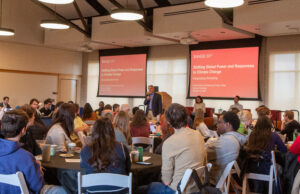
The simulation was part of our Great Issues in International Relations course, a class most first-year graduate students at Korbel take in their first fall quarter. It’s an exciting course that introduces us to the field and multiple faculty members. This quarter, the simulation happened in collaboration with Korbel’s own Pardee Institute and the Bertelsmann Foundation’s Range Forecasting, which meant we got to learn from experts in the field of forecasting. Dean Fritz Mayer addressed us before the simulation began, explaining how forecasting has always been a cornerstone of Korbel’s education. After learning a little bit about what Range does, we were split into ten discussion groups to discuss how trends in the “great issues” – globalization, nationalism, inequality, and democratic backsliding – could impact climate change response.
This simulation allowed me to connect with peers in other degree programs and interact with students with different perspectives to reflect on climate change solutions. While I sit next to different students every Monday morning, it was a different experience collaborating with them and learning from them, which I found to be the best part of the day.
In our groups, we assessed what signs would indicate one of three scenarios related to international cooperation for solving climate change. The scenarios highlighted the connection between climate change and inequity in development, with the third scenario being international policy moving to solve both climate change and underdevelopment. Finally, we used the Range forecasting platform to answer: “Will developed countries deliver $200 billion USD or more in financing to developing countries for climate action between January 1, 2026, and December 31, 2026?” This question required reflecting on our discussion and our readings for the week to determine the signs that this could happen. After using the platform to individually decide what we thought the probability was, we got to read through everyone else’s perspectives. My cohort spans multiple home countries and undergraduate degree programs, so it was exciting to see how people’s perspectives came through in their reflections.
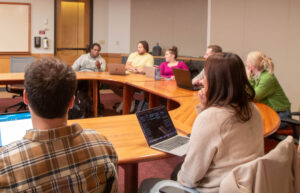
Thanks to all of our discussions, I got a better grasp on modern global governance and climate change solutions. Post-graduation, forecasting skills will give any student, regardless of degree program, a competitive edge. Overall, forecasting skills and experiences like these are among what set Korbel graduates apart and allow us to have careers working to minimize harm across all our fields. I’m grateful for this opportunity, especially right away, given how many other first-year graduate students there are. This experience was engaging and informative, and made me look forward to every opportunity that I will have throughout my program.
This reflection was written by current Korbel graduate student, Erin Mitchell (Master of Public Policy, 2026).
On October 7, 2025, I had the distinct honor of attending the Axios Denver Newsmakers event, hosted by Korbel’s own Scrivner Institute of Public Policy, and sponsored by The Denver Foundation. The event featured an engaging and insightful question-and-answer session with Denver Mayor Mike Johnston, focused on the proposed Vibrant Denver Bond, a five-part, $950 million general bond question that will appear on the November 4, 2025, ballot. Beyond listening to the discussion, I also had the incredible opportunity to speak directly with Mayor Johnston, gaining firsthand insight into how local leaders approach complex policy challenges.
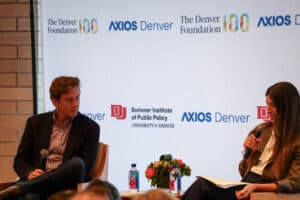
The event began with an overview of the proposed bond, setting the stage for an in-depth conversation about how public financing can shape the city’s future, which provided a rare opportunity to hear directly from the mayor about one of the most significant public financing proposals in Denver’s recent history. The Vibrant Denver Bond is designed to fund critical capital improvement projects across the city, addressing infrastructure, housing, and community development needs. Mayor Johnston emphasized that the bond’s five components, affordable housing, transportation and mobility, parks and recreation, public facilities, and economic development, represent strategic investments in Denver’s long-term vitality and inclusivity.
During the conversation, Johnston highlighted the city’s urgent need to expand affordable housing and improve public spaces to maintain Denver’s quality of life as the population continues to grow. He explained that the bond would not increase property tax rates but would instead reauthorize expiring debt, allowing the city to reinvest in essential infrastructure without overburdening taxpayers. This approach, he argued, reflects responsible fiscal management while ensuring the benefits of growth are broadly shared.
Following the bond discussion, the audience was given the opportunity to ask questions, which touched on issues such as homelessness, climate resilience, and economic equity. Mayor Johnston spoke candidly about balancing Denver’s rapid development with sustainability and social responsibility. He stressed the importance of public engagement and voter participation, noting that every Denver resident has a stake in shaping the city’s future.
This event truly reflected the civic spirit of collaboration between local government, academic institutions, and philanthropic organizations. Axios Denver’s format, focused, conversational, and journalistic, allowed thoughtful dialogue rather than scripted speeches. This approach ultimately led myself and several other graduate students having the unique opportunity to speak one-on-one with Mayor Johnston about the upcoming ballot issues and other pressing policy issues affecting Denver and the state of Colorado.
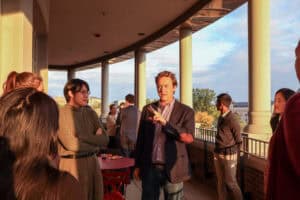
Mayor Johnston spoke openly and enthusiastically with us about everything from our future career goals to local development projects, including plans for the new Mile High Stadium and its role in Denver’s economic and recreational growth.
As a Public Policy student, I spend much of my time studying elected officials, their policies, and their impact on society, but I never expected to speak face-to-face with one. Korbel made that possible by facilitating these conversations with the mayor. His friendly, down-to-earth demeanor quickly put our group at ease, and as we stood on the Sie Complex balcony chatting as equals, it struck me that elected officials are, at their core, people like us. That moment brought to life what our work in public policy is all about: creating meaningful connections and striving, regardless of affiliation, to make our communities stronger and more equitable.
For me, attending the Axios Denver News Makers event was both informative and inspiring. It underscored the importance of civic participation and policy literacy, reminding attendees that democracy functions best when communities are informed and engaged. As Denver prepares for the upcoming vote, the discussion served as a timely reminder that the city’s growth and vibrancy depend on the collective choices of its residents. For me, as a student, it was a rare chance to witness these principles in action and to see firsthand how public policy shapes real communities, and it was a reminder that our studies are not just theoretical but are preparing us to actively contribute to the future of the city and the world around us.
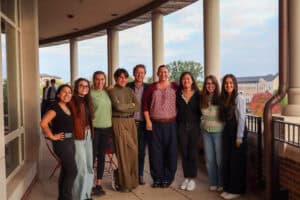
Each spring, Professor Janney Carpenter’s Social Impact and Sustainability Lab offers students a unique opportunity: ten weeks of hands-on project work that connects classroom theory with engaged community work. Within the first few seminars, students are introduced to leaders from local and global institutions that face real-world challenges, like nonprofits, funders and impact investors, and other social enterprises. Soon after, students partner with these organizations, gaining hands-on experience that often kicks off a new career with renowned institutions like the American Red Cross, the Gates Family Foundation, and others.
This class’s designation as a “lab” is a meaningful one. The stakes are real, the deadlines matter, and the work students produce doesn’t sit on a shelf. It influences how organizations make decisions about sustainability, funding, and community impact.
“I come up with students’ projects by working with the client ahead of time,” Professor Carpenter said. “I develop a scope of work for each project and then present everything to the students. They rank which ones they like the most. Then, I put them into teams, which gives them about eight weeks of project work.”
With Professor Carpenter’s scope of work in hand, students develop a plan together and communicate directly with the client. Most of the time, their projects involve systems mapping, which tasks students with understanding how the organization works and identifying key stakeholders, partners, and obstacles. Current Korbel graduate student Aidan Smith, who recently shared his experience as an AmeriCorps fellow, used this class to interview internal staff at the American Red Cross.
“Aidan and his team partner did interviews locally,” Professor Carpenter said. “They spoke with Veterans Affairs (VA) offices for the Red Cross, and they identified an issue I’d never considered. The VA was going digital, moving all appointments and announcements online. But that was excluding people who were less digitally inclined, particularly seniors. Aidan and his partner figured that out and became part of the solution. They connected the VA with nonprofits who specialize in helping seniors get more comfortable with digital tools.”
Aidan’s story is one of many. Another graduate student and AmeriCorps fellow, Kip Newman, worked with the African Community Center — a refugee resettlement organization — by helping them grapple with new funding challenges under the current administration. Others worked with a D.C.-based B Corp, Cambium Carbon, to help create a supply chain that transports chopped wood from cities into a supply chain that turns trash into recycled products. The scope of these projects highlights the many paths that students can take, and with Professor Carpenter at the helm, every project leaves a tangible mark on the organizations and communities they serve.
Before joining Korbel as an adjunct professor, Professor Carpenter started at JPMorgan in Corporate Finance. She eventually took those skills into three decades of consulting work at the intersection of finance, philanthropy, sustainability, and education. As an expert in all these fields, she knows firsthand what today’s organizations need from emerging professionals.
“I teach students to ask the right questions in these spaces, which isn’t easy,” she shared. “How do you balance social or environmental impact goals with financial sustainability? How can organizations develop strategy with insights and feedback from customers and communities? How can you align strategy with available funding resources? How do you choose and measure the indicators of progress? All organizations need data for continual learning so they can adapt to changing market conditions and client needs.
But Professor Carpenter insists those challenges mirror the realities of social impact work. One common revelation for students is that scaling an organization — particularly a nonprofit — isn’t always about growth. “There are lots of ways to scale impact,” she said. “It could be increasing awareness, sharing information to inform policy decisions, or finding corporate funding partners.”
Based on her course evaluations, Professor Carpenter shared the biggest takeaway students often have: “You don’t design the best solutions in a conference room. You do it by going out there and talking to people. That’s what this class helps students do, sometimes for the first time. Building the communities you want to see starts by being a part of them.”
The Social Impact and Sustainability Lab is a prime example of what makes Korbel distinctive: rigorous academic training that’s applied to solving real problems with practitioners in the field. Learn more about our master’s programs to see how you can gain the skills to make a greater impact in your career and community.
For nearly three decades, the International Career Advancement Program (ICAP), proudly hosted at the Aspen Institute, has stood at the forefront of building a stronger American leadership presence in international affairs and public policy. ICAP is a community, a catalyst, and a promise, which firmly believes that the United States will be stronger and more effective on the world stage when leadership is cultivated with excellence and vision.
What began in 1997 at the Josef Korbel School of Global and Public Affairs, as an initiative led by Dean Emeritus Tom Rowe, has grown into one of the nation’s most respected professional development programs, one that changes careers, transforms lives, and strengthens our country’s global impact. At its core, ICAP was created to open doors for mid-career professionals across government, nonprofit, and private sectors, and it continues to do so today.
“Most career development programs offer a sense of personal growth, but ICAP gave me more than that. It offered me a sense of motivation and purpose, gave me insights into my leadership style and was instrumental in getting me across the threshold into executive roles.”
- Amb. Carmen Cantor, ICAP Fellow 2012
ICAP fellows step into the program with the opportunity to gain mentorship from accomplished senior leaders, career advising, and a platform to engage with pressing policy challenges. Beyond that, the program creates a rare space to openly discuss personal and professional challenges, explore solutions with peers facing similar issues, and discover alternative leadership and management styles. Set in Aspen’s reflective mountain landscape, ICAP offers a transformative experience that blends leadership development, values-based career coaching, and policy dialogue with intentional opportunities for self-care and reflection. ICAP fellows build lifelong friendships and professional ties, supported by 20–30 mentors and career advisors, and join a growing global network of over 900 alumni through the ICAP Fellows Association. Together, this holistic approach equips fellows not only with the tools for immediate growth, but also with a lifelong community dedicated to mutual support and leadership excellence.
“I really enjoyed my time at ICAP Aspen! Going into it, I was intimidated by the caliber of professionals and experts in the room. But as I got to know them, I realized they were some of the most down-to-earth people who genuinely cared about my success.”
- Victory, Korbel Graduate Assistant for ICAP; MA, International Security, 2027
At its core, ICAP believes that America’s leadership is strongest when it draws on the full talent, creativity, and dedication of its people. Year after year, the caliber of ICAP Fellows proves this true. From Ambassadors and White House appointees to CEOs, nonprofit executives, and founders of innovative ventures, ICAP alumni have become leaders whose voices shape global affairs with distinction.
Each year, ICAP selects a highly competitive cohort of 30–40 mid-career professionals. Together, they begin their journey in Washington, D.C., before traveling to Aspen, Colorado, where the mountain setting provides space for reflection and growth. While the week-long retreat is the heart of the program, fellows also join the ICAP Fellows Association, a vibrant network of more than 900 alumni who remain deeply connected, offering long-term support and collaboration.
The impact speaks for itself. ICAP has been recognized by The Economist magazine as among the top 10 Diversity Networks globally. Its fellows now serve at the highest levels of government, in boardrooms, classrooms, and across the global stage. Graduate students at the Korbel School also benefit, serving as ICAP interns and assistants, gaining invaluable exposure to leaders who inspire and guide them.
As ICAP looks ahead, one truth remains clear: the demand for thoughtful, ethical, and capable leadership in global affairs has never been greater. And ICAP will continue to rise to meet that need, empowering leaders today to shape a better tomorrow.
Learn more about ICAP here.
From the steel city of Pueblo, Colorado to the halls of government, recent Korbel alumnus Jacob Topping’s journey is a testament to what drive, purpose, and community roots can make possible. A proud first-generation college graduate, Jacob grew up with a strong belief that people from small towns deserve a voice in decisions that shape their future. After graduating with his Master of Public Policy (MPP) in 2024, Jacob has dedicated his career to elevating those voices. “I was born and raised in Pueblo,” he shared, “and I am now the Southeastern Regional Representative for Senator Michael Bennet.”
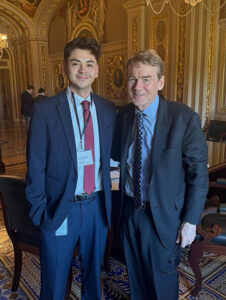
Jacob sat down for an interview while on the road with the Colorado (CO) Project, a community effort led by the Scrivner Institute of Public Policy to build a state platform for deliberation on issues affecting Colorado. This is one of many initiatives where he gives back to his community. As a kid in Pueblo, he developed a lifelong desire to serve, always believing that public policy isn’t something that happens far away. It affects real people, real families, and real communities like his.
Yet ambition alone wasn’t enough. Jacob knew he would have to build his path step by step by expanding his skillset and growing his professional network. That’s what drove him to Korbel.
Pueblo Roots, Public Service Goals
Jacob’s pride in his Pueblo roots is central to who he is. His hometown shaped his values, work ethic, and determination to pursue a career that could make a difference, prompting him to first imagine a career in government as a high school senior. The spring before graduation, his school district went on strike. For most students, it was a disruption; for Jacob, it was an awakening. “That was my first dip in the waters of the political side and governance side of local policy,” he recalled. “Seeing how that really impacts not only our educators but our students in the district definitely sparked my fire for this world.”
From there, the idea of public service never left his long-term plans.
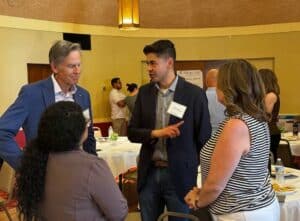
Growing up in Pueblo reinforced Jacob’s sense of responsibility to his community. His parents ran a small business, which gave him an early education in hard work and the importance of showing up for others. “I’ve always been in touch with the community down there,” he said. “Learning the values of hard work definitely informed my long-term career aspirations. I think that’s why I ended up in the role that I did.”
Today, Jacob’s role with Senator Michael Bennet allows him to work not only in Pueblo but across southeastern Colorado, connecting residents, counties, and nonprofits with resources and opportunities. Every day, he draws on the lessons he learned growing up: hard work, community responsibility, and the value of showing up for others. He wants to help shape policies and programs that make a tangible difference in people’s lives. For Jacob, public service isn’t just a career; it’s a way to give back to the place that first inspired him to imagine what’s possible.
From Classroom Connections to Real-World Impact
When Jacob arrived at Korbel for his MPP, he found a community eager to provide support and open doors, helping him secure his post-graduation career in Senator Michael Bennet’s office.
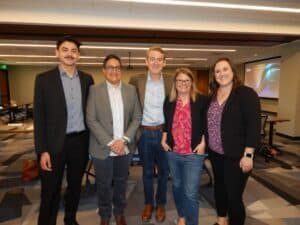
Jacob attributes much of his success to the faculty mentorship he received during his program, particularly from Professor Naazneen Barma. “Dr. Barma was a tremendous asset in my academic endeavors,” he said. Through her guidance, he also became involved with the CO Project, strengthening his connection to Senator Bennet and introducing him to more of Colorado’s public servants and their passion for community work. This year’s CO Project initiative—CO Project 2.0: Rural Renaissance—is a community-led effort to shape the future of Colorado through its rural communities, like those in the Southeastern Region where Jacob now works.
Between participation in the CO Project, and mentorship from faculty like Dr. Barma, Jacob graduated feeling prepared to launch a career of impact. “The MPP degree set me up perfectly for this role with Senator Bennet,” he said. “I came in as a first-generation student, and having the full support of not only the faculty but the community at Korbel is definitely something that I leaned on a lot.”
Korbel’s support—both during his studies and after graduation—has remained a constant, providing the skills, relationships, and resources that allow him to thrive in public service
A Full-Circle Moment
Now, in his full-time role with Senator Bennet, Jacob covers southeastern Colorado counties, helping communities access resources and advancing legislative priorities. “Working for Senator Bennet has given me a new perspective on the real, on-the-ground impact we can have in communities like Alamosa County, Pueblo County, or out east in Prowers County,” he says. “Being able to be a real champion for rural Colorado is definitely something that I’ve been able to really appreciate in this role.”
Looking back, Jacob sees his career path as a return home, literally and figuratively. “My first internship experience was during undergrad when I was a student at CSU Pueblo, back in Senator Bennet’s office in 2019. So, this is almost as full circle as you can get,” he said with a smile.
For Jacob, what makes the journey meaningful is not just the professional milestones, but the chance to serve the community that raised him. While Korbel gave him the skills and connections to do that, Pueblo gave him the values to keep going.
How do leaders shape, and how are they shaped, by international relations? What drives a leader to travel from one country to another or to any other place in the world? What can we learn about travel, trade, conflict, diplomacy, democracy, and other interconnected systems by researching the travel patterns of country and organization leaders? These central questions drive the Pardee Institute’s decade-long COLT (Country and Organization Leader Travel) project, which the U.S. Government sponsors.
The Pardee Institute explored these and related research questions for an audience of faculty, students, and staff from the University of Denver’s Josef Korbel School of Global and Public Affairs (the Korbel School) during its first-ever Lunch and Learn seminar.

Following an introduction of the COLT dataset and Lunch and Learn series by Pardee Institute Director Jonathan Moyer, Pardee Institute COLT Program Manager Kylie McKee, and Director of Analysis Collin Meisel took turns presenting on different facets of the COLT project.
The COLT project captures data on Heads of Government and State (HOGS) travel from 1990 through the present day for 212 countries and territories. This scale of data collection requires large-scale infrastructure and staff, from coders to vetters to team leads (all positions held by students), until ultimately the data reaches McKee and Meisel.
This dataset tracks over 43 variables and 70 biographical variables for each leader, creating an extensive dataset that requires countless hours to track and ensure accuracy, McKee described. McKee went on to detail her team’s research protocol: monthly updates to the data, as well as annual public reports, made possible by weekly tracking of HOGS travel, reviews of data for errors and/or gaps, and extensive final reviews. This work is divided into four groups of RAs who research HOGS from specific regions of the world.
In Meisel’s words, the COLT dataset is not trying to prove cause and effect; it is trying to see “what moves together.” Meisel, McKee, and their team of student researchers have found the frequency and destination of world leader visits correlate strongly with material interests (such as trade, arms deals, and foreign aid), institutional co-membership (like NATO or the EU), and patterns of conflict. This research matters because diplomatic travel provides a high-frequency, actionable indicator of shifting geopolitical affinities and power dynamics.
Another question that the COLT project is attempting to tackle is the puzzle of leader travel. With all the modern advances in technology —from phone calls to video conferencing —along with the time and potential dangers involved in traveling, what are the benefits of leaders traveling abroad to meet with other leaders in person? The literature suggests that travel plays a significant role in shaping leader opinions, as seen in trade and relationships between HOGS, Meisel explained. However, most of this literature is focused on one country or a region of the world. The COLT project addresses a major missing piece of the puzzle – its scope is global, making it truly unique and a flagship project for this sort of data collection.
Because the data is so exhaustive, it can be challenging to know for sure how much of it is captured by the researchers—is it simply the tip of the iceberg, with much concealed beneath the surface, or is most of it visible to these teams? To address these demands, McKee answered that the teams on Pardee’s COLT project are always innovating their methods and processes so that the data can be better used as a resource and source of lessons for future data gathering. For example, McKee shared that Pardee will soon use AI to streamline its data by gathering qualitative information in a systematic format for analysis.
The event ended with a question-and-answer portion, filled with questions ranging from the use of the data set as a diagnostic tool to which regions have the most tracked travel to if the project had any student position openings. Other questions addressed the uses of AI, how the COLT data is utilized, and where it is sourced.
To learn more about the COLT Project, access the COLT data, or read the COLT analysis published in International Studies Quarterly, click here.
This inaugural Lunch and Learn event is part of a new series of Pardee-hosted lunchtime seminars designed to inform the broader Korbel School community about the research approach and applications of the Pardee Institute's work.
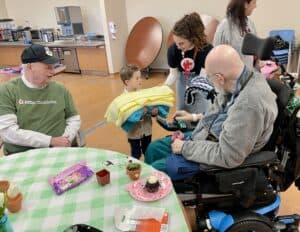
For alumnus Abigail (Abby) Russell, her job at the American Red Cross is the extension of a career that began in graduate school. “I was in the dual degree program,” Abby recalled. “I did a Master’s in Social Work and a Master’s in International Human Rights. And because I also completed Korbel’s Humanitarian Assistance Certificate, I needed internship hours for all three.” Her solution? To use the Korbel School’s Office of Career and Professional Development (OCPD) to facilitate an introduction to one of the world's most renowned humanitarian organizations. That conversation with the Red Cross was the catalyst for a career of community-driven impact.
As a graduate student, she worked with the Red Cross’s Disaster Cycle Services department, but her internship quickly evolved. “The director of the Service to the Armed Forces and International Services department found out about me and asked me to join her team, too,” Abby said. “She gave me all the training I needed to teach international humanitarian law, which became my second role there.” Abby ended up balancing two Red Cross internships across different departments, applying her dual training in real-time.

At the University of Denver’s School of Social Work, Abby would make another pivotal career move. She joined a faculty-led program called the Bosnian Transition, which was designed to be an immersive, short-term educational trip. But after learning so much about Bosnia during her time working under the School of Social Work’s Professor Ann Petrila, she decided to stay. “I packed everything up, left Denver, and moved to Bosnia without a job lined up. I just knew I wanted to be part of that community long-term.”
Within weeks, she was working with the Srebrenica Memorial Center and a women’s empowerment organization called Nahla. And when Professor Petrila brought new student groups to Bosnia, Abby stepped in as a field supervisor. “It was my first time officially mentoring graduate-level interns,” she said. “It’s not just about helping them complete tasks, it’s about supporting their professional development, connecting them to the local context, and continuing to guide them after the internship ends.”
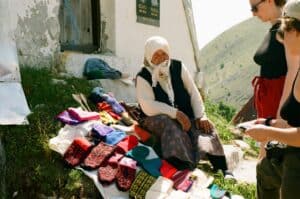
When Abby moved back to Colorado, her previous experiences facilitated by Korbel and the School of Social Work made her a shoo-in for full-time work with the Red Cross. Today, she’s the regional program manager for the local Colorado and Wyoming office, helping with their national effort called Community Mobilization. “We’ve been working on networking, expanding, and adapting our programs to fit into local communities across the United States better,” she said. “And then mobilizing those communities to be more independent and self-sustainable.”
Abby also supervises Korbel students who are interning with the Red Cross through the AmeriCorps internship program. “When I was first asked to supervise AmeriCorps interns, I said yes immediately,” Abby said. “It felt like a perfect opportunity to give back, not just to Korbel and the Red Cross, but to the next generation of humanitarian professionals.”
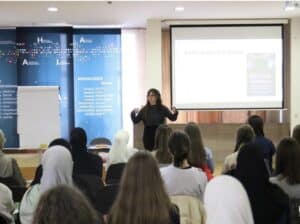
That full-circle moment—going from intern to supervisor, student to mentor—reflects the real-world impact of a Korbel education. Abby’s story shows that graduate study at Korbel isn’t just about academic theory. It’s about building the skills, relationships, and values that lead directly to global careers.
For prospective students wondering whether Korbel is the right fit, Abby offers a clear answer: “The support is always there. From faculty mentors to internship connections, I never felt alone. If you’re driven to make a difference, locally or globally, Korbel opens the doors. You just have to walk through them.”
Colorado – From October 8–10, 2025, a diverse group of leaders from across Colorado will convene in Northwest Colorado’s Yampa Valley as part of the Colorado Project’s Rural Learning Tour. The Colorado Project is a statewide initiative designed to advance shared prosperity and inclusive, sustainable growth in all regions of Colorado. It is convened by the Josef Korbel School of Global and Public Affairs and the Scrivner Institute of Public Policy at the University of Denver.
Now in its second iteration, the Colorado Project is focusing on the distinctive challenges rural communities face and the innovative, locally driven solutions they are generating. The Learning Tour seeks to elevate this ingenuity, highlighting creative interventions in sustainability, economic mobility, and entrepreneurship.
The Yampa Valley convening will spotlight local leadership in climate action, housing affordability, workforce development, and economic diversification, with site visits across Craig, Hayden, and Steamboat Springs. Participants will learn about the Hayden Geothermal Industrial Park, explore collaborative land-use and downtown revitalization efforts, and engage with community-driven initiatives like Steamboat Creates, the Yampa Valley Food Marketplace, and the Yampa Valley Housing Authority.
Tammie Delaney, co-host in Hayden and community leader, emphasized the unique nature of the Valley: “The Yampa Valley is at the crossroads of tradition and transition. From ranching to renewables, we are learning how to preserve what makes this place special while preparing for the future. The Colorado Project gives us a chance to connect these efforts to a broader statewide conversation.”
Tim Wohlgenant, co-host and President and CEO of the Yampa Valley Community Foundation, highlights the importance of the Learning Tour coming to the Valley: “This tour is about elevating local voices and making sure rural Colorado is not left behind. By bringing people together across sectors, from housing and healthcare to energy and the arts, we’re building the partnerships that will shape a resilient future.”
Participants will also engage in panels on economic development and workforce, explore mental and behavioral health systems collaboration, and discuss collaborative solutions to address the Valley’s rising cost of living. The convening will close with a session dedicated to actionable next steps and commitments to align local solutions with statewide strategies.
The Yampa Valley is the final visit in the 2025 Colorado Project Learning Tour. It follows successful convenings in Northeast Colorado (June) and the San Luis Valley (August). Although this Learning Tour is drawing to a close, the project will continue to highlight success stories that lead to actionable policy solutions for the state.
Copyright ©2025 University of Denver | All rights reserved | The University of Denver is an equal opportunity institution